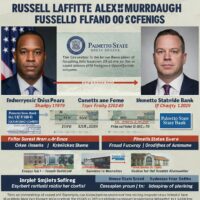Canadian Man Convicted Of Multi-Million Dollar Fraud Targeting U.S. Lawyers
HARRISBURG – The United States Attorney’s Office for the Middle District of Pennsylvania announced today that Henry Okpalefe, age 49, of Toronto, Ontario, Canada, was convicted of conspiracy to commit mail fraud, wire fraud and money laundering. The three-day bench trial was held before United States District Court Judge John E. Jones, III.
According to United States Attorney Bruce D. Brandler, between 2008 and 2010, Okpalefe and his co-conspirators stole over $23 million from hundreds of lawyers and law firms in the Middle District of Pennsylvania and nationwide. Under the guise of seeking legal representation, the conspirators contacted attorneys and law firms in the United States using fake email accounts. Once an attorney or law firm agreed to represent the purported client, the conspirators sent bank checks through the mail and instructed them to deposit the money into their IOLTA accounts. From there, the attorneys were provided with wire instructions and they wired their legitimate funds to Asian bank accounts. Before the counterfeit checks were returned as fraudulent, the money had already been withdrawn by co-conspirators in Asia and distributed to conspirators’ bank accounts in Nigeria and Canada. Okpalefe and his co-conspirators operated in Canada, Nigeria, Japan and South Korea.
The case was investigated by the United States Secret Service, the Federal Bureau of Investigation and the United States Postal Inspection Service. The Toronto Strategic Partnership and the Toronto Police Service provided integral assistance in the investigation and prosecution of the case. The case was prosecuted by Assistant United States Attorneys Chelsea Schinnour and Kim Douglas Daniel.
The maximum penalty under federal law is 20 years of imprisonment, a term of supervised release following imprisonment, and a fine. Under the Federal Sentencing Guidelines, the Judge is also required to consider and weigh a number of factors, including the nature, circumstances and seriousness of the offense; the history and characteristics of the defendant; and the need to punish the defendant, protect the public and provide for the defendant’s educational, vocational and medical needs. For these reasons, the statutory maximum penalty for the offense is not an accurate indicator of the potential sentence for a specific defendant.
The United States Postal Inspection Service, Harrisburg Domicile, has reason to believe that this scheme is ongoing. The United States Postal Inspection Service encourages anyone receiving a check in the mail to be vigilant and to work closely with financial institutions to understand when a check has been verified as legitimate, even if funds are immediately made available upon deposit of the check. If you or someone you know has information about this please contact Inspector Rachel R. Heintz at 717-257-2342, 1425 Crooked Hill Road P.O. Box 60035, Harrisburg, Pennsylvania 17106-0035.













